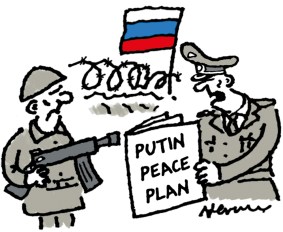
The US general Mark Clark knew a thing or two about dealing with Russians. In the aftermath of the defeat of Nazi Germany, Clark commanded the American occupying forces in Austria. His Soviet opposite number, and nominal ally, was Marshal Ivan Konev. The two war heroes were tasked with pacifying the conquered and divided country at the dawn of the Cold War.
‘The Russians were not interested in teamwork,’ recalled Clark in his 1950 memoir, Calculated Risk. ‘They wanted to keep things boiling… They were accustomed to the use of force. They were skilled in exploiting any sign of weakness or uncertainty or appeasement. This was their national policy.’
Two things infuriated Clark more than anything. One was the Soviets’ constant ‘resort to lying, to betrayal, to the repudiation of solemn pledges’. The other was their practice of making deliberately unreasonable demands. After one particularly frustrating meeting, Clark confronted Konev. ‘You’ve made ten demands at this council that we can’t meet,’ fumed Clark. ‘But suppose I should say, “All right. We agree to all ten demands.” Then what would you do?’ Konev’s answer was for once straight. ‘Tomorrow,’ he said, ‘I’d have ten new ones.’
Sounds familiar? The combination of barefaced lying and outrageous demands described by Clark is, today, the entire basis of Vladimir Putin’s negotiating stance over Ukraine. The diplomatic playbook of the modern Kremlin appears to be copied most faithfully from its Soviet predecessors.
One of the Kremlin’s favourite tactics is to do both good-cop and bad-cop diplomacy at the same time. This week, for instance, Putin appeared to play the peacemaker by announcing a unilateral three-day ceasefire to cover the celebrations of Victory Day, which Russia celebrates on 9 May. Yet that announcement came just hours after foreign minister Sergei Lavrov – who began his diplomatic career in Sri Lanka in the mid-1970s – grimly announced that Moscow’s demands of Ukraine remained absolutely unchanged despite two months of intense diplomacy by Donald Trump’s administration.
Putin pretends to be willing and ready to talk peace – and even to suspend his attacks on Ukraine. Yet he demands official international recognition of Russia’s occupation of all areas of Ukraine under Moscow’s control, plus restrictions on Ukraine’s future armed forces and the repeal of laws discriminating against Russian speakers and churches.
The diplomatic playbook of the modern Kremlin appears to be copied from its Soviet predecessors
There are a few important differences between Soviet tactics and modern Russian ones. One is that the USSR had a coherent state ideology, as well as a clear strategy of systematically building its dominance in any corner of the world where it could gain an economic or political foothold. Putin, being far poorer both in allies and financial clout than his Soviet predecessors, is forced to be a tactician rather than a strategist.
Most of his wars – against Georgia in 2008, annexing Crimea in 2014, sending a squadron of warplanes to Syria in 2015 – were snap decisions to take advantage of fast-changing circumstances. Putin’s one attempt at a major strategic invasion of Ukraine, in February 2022, turned out to be a major screw-up. The invasion was conceived as a massively aggravated coup aimed at bringing regime change to Kyiv. It was supposed to be over after just three days of shock and awe. Putin did not by any means intend to become mired in this grinding, bloody and expensive war.

So what does Putin want? Whatever he can get away with. His economy is suffering from low oil prices and the massive financial strains of war – but not nearly as much as Ukraine’s. Currently, therefore, Putin seems to believe that time is on his side. The longer he sticks to his guns – literally and metaphorically – the worse the war will go for Ukraine in terms of a chronic manpower shortage, which is soon to be compounded by a weapons shortage as US support falls away.
Russia may not exactly be winning, but neither is it losing – and by fighting on, the chances of a military or political crisis in Kyiv increase. That is not a coherent strategy, but as a tactic it will serve Putin for the time being, until something – for instance increased American economic pressure – makes the war’s cost too high to bear and its benefits too small to be worth continuing.
How should Trump, and the West in general, negotiate with the Kremlin? The Soviets ‘respect force; perhaps they respect nothing in the world except force’, observed Mark Clark. ‘And when confronted with strength and determination they stop, look, and listen.’ But that logic of peace through superior firepower, often repeated by Baltic and other Eastern European nations, does not apply in today’s relations with Putin.
Thankfully, neither the US nor Europe is at war with Russia. The most the West has practically been able to do is to ensure that our Ukrainian allies who are actually fighting a hot war against Moscow are given as much weaponry as possible. Yet it’s equally clear that while the Ukrainians have fought Russia to something close to a standstill – a remarkable military achievement in its own right, by the way, and one wholly unexpected at the outbreak of the war – that standstill is also a stalemate. Artillery, drones and rockets may help Kyiv defend itself from further Russian advance, but no serious military experts see a path for Ukraine to crush Moscow’s forces militarily.

Clark’s message was that the US ‘must give notice to the world, and to anyone in our own country who would change our form of government, that we intend to be strong; that we intend to preserve the blessings of freedom for which the men and women of the Fifth Army, and millions of other Americans, fought and died’.
What would he think of Trump’s approach, which has been to try to end the war as fast as possible by agreeing to almost every Kremlin demand? Or of Putin’s re-action, which is to troll Trump with constant attacks on Ukrainian civilians and an arrogant refusal to budge on key red lines despite Washington’s rollover?








Comments